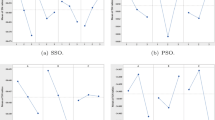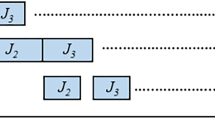Abstract
We consider scheduling a batch of jobs with stochastic processing times on parallel machines. We derive various new formulae for the expected flowtime and weighted flowtime under general scheduling rules. Smith's Rule, which orders job starts by decreasing ratio of weight to expected processing time provides a natural heuristic for this problem. We obtain a bound on the worst case difference between the expected weighted flow time under Smith's Rule and under an optimal policy. For a wide class of processing time distributions, this bound is of oderO(1) and does not increase with the number of jobs.
Similar content being viewed by others
References
P. Billingsley,Measure and Problility (Wiley, New York, 1982).
J. Bruno, P.J. Downey and G. Frederikson, Sequencing tasks with exponential service times to minimize the expected flow time or makespan, J. Assoc. Comput. Mach. 28(1981)100–113.
E.G. Coffman, Jr., M. Hofri and G. Weiss, Scheduling stochastic jobs with a two poin distribution on two parallel machines, Prob. Eng. Inform. Sci. 3(1987)89–116.
D.R. Cox,Renewal Theory, (Methuen, London, 1962).
D.R. Cox and H.D. Miller,Stochastic Processes (Methuen, London, 1965).
P.J. Downey, Distribution free bounds on the expectation of the maximum with scheduling applications, Oper. Res. Lett. 9(1990)189–201.
W.L. Eastman, S. Even and I.M. Isaacs, Bounds for the optimal scheduling ofn jobs onm processors, Manag. Sci. 11(1964)268–279.
W. Feller,An Introduction to Probability Theory and Its Applications, Vol. 2, 2nd ed. (Wiley, New York, 1971).
J.B.G. Frenk and A.H.G. Rinnooy Kan, The asymptotic optimality of the LPT rule. Math. Oper. Res. 12(1987)241–254.
M.R. Garey and D.S. Johnson,Computers and Intractability: A Guide to the Theory of NP Completeness (Freeman, San Francisco, 1979).
J. Gittins, Bandit processes and dynamic allocation indices, J. Roy. Statist. Soc. B 14(1979)148–167.
J. Gittins, Forwards induction and dynamic allocation indices, inDeterministic and Stochastic Scheduling, ed. M.A.H. Dempster et al., (Reidel, Dordrecht, 1982), pp. 125–156.
J. Gittins and P. Nash, Scheduling, queues, and dynamic allocation indices,Proc. EMS, Prague, 1974 (Czechoslovak Academy of Sciences, Prague, 1977), pp. 191–202.
F.D. Glazebook, Scheduling tasks with exponential service times on parallel processors, J. Appl. Prob. 16(1979)685–689.
R.L. Graham, Bounds on the performance of scheduling algorithms, in:Computer and Job Shop Scheduling Theory, ed. E.G. Coffman Jr. (Wiley, New York, 1976), pp. 165–227.
J.M. Harrison, Dynamic scheduling of a multiclass queue: Discount optimality. Oper. Res. 23(1975)270–282.
T. Kämpke, On the optimality of static priority policies in stochastic scheduling on parallel machines, J. Appl. Prol. 24(1987)430–448.
T. Kawaguchi and S. Kyan, Worst case bound of an LRF schedule for the mean weighted flowtime problem, SIAM J. Comput. 15(1986)1119–1129.
G.P. Klimov, Time-sharing service system, I, Theory Prob. Appl. 19(1974)532–551.
J.K. Lenstra, A.H.G. Rinnooy Kan and P. Brucker, Complexity of machine scheduling problems, Ann. Discr. Math. 1(1977)343–362.
T. Lehtonne, Scheduling jobs with exponential processing times on parallel machines, J. Appl. Prob. 25(1988) 752–762.
R. McNaughton, Scheduling with deadlines and loss functions, Manag. Sci. 6(1959)1–12.
I. Meilijson and G. Weiss, Multiple feedback at a single server station, Stochastic Processes Appl. 5(1977)195–205.
M. Pinedo and G. Weiss, Scheduling stochastic tasks on two parallel processors. Naval Res. Logist. Quart. 26(1979)527–536.
M. Pinedo and G. Weiss, The largest variance first policy in some stochastic scheduling problems, Oper. Res. 35(1987)884–891.
M. Rothkopf, Scheduling with random service times. Manag. Sci. 12(1966)707–713.
K.C. Sevick, Scheduling for minimum total loss using service time distributions. J. Assoc. Comput. March. 21(1974)66–75.
J.F. Shapiro, Turmpike planning horizons for a Markovian decision model. Manag. Sci. 14(1968) 292–300.
W.E. Smith, Various optimizers for single stage production, Naval Res. Logist. Quart. 3(1956)59–66.
J. Van der Wal and A. Hordijk, Private communication, Ober Wolfach Meeting on Operations Research (February, 1987).
R.R. Weber, Scheduling jobs with stochastic processing requirements on parallel machines to minimize makespan of flow time. J. App. Prob. 19(1982)167–182.
R.R. Weber, P. Varaiya and J. Walrand, Scheduling jobs with stochastically ordered processing times on parallel machines to minimize expected flowtime. J. Appl. Prob. 23(1986)841–847.
Author information
Authors and Affiliations
Additional information
This research was supported in part by NSF Grant ECS-8712798.
Rights and permissions
About this article
Cite this article
Weiss, G. Approximation results in parallel machnies stochastic scheduling. Ann Oper Res 26, 195–242 (1990). https://doi.org/10.1007/BF02248591
Published:
Issue Date:
DOI: https://doi.org/10.1007/BF02248591




